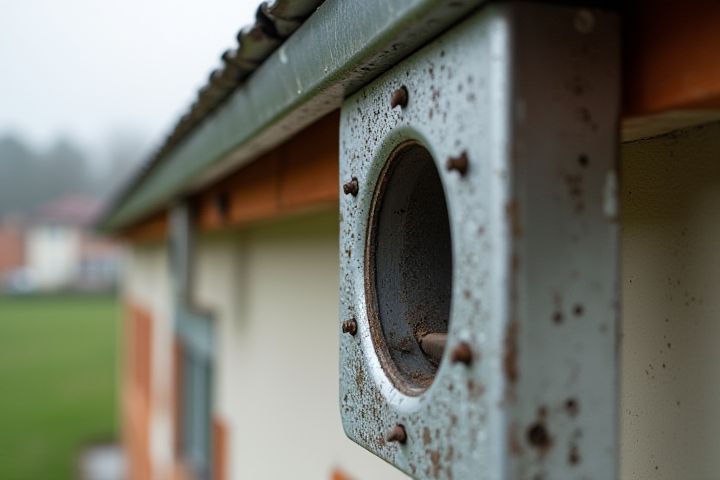
Proper ventilation is essential for maintaining indoor air quality in your home, preventing the buildup of moisture, and reducing the risk of mold growth. Effective air circulation helps to remove airborne pollutants, such as volatile organic compounds (VOCs), allergens, and carbon dioxide, ensuring that you breathe clean, fresh air. Ventilation systems can also help regulate indoor temperature, making your space more comfortable and energy-efficient. Inadequate ventilation can lead to stale air, unpleasant odors, and increased humidity levels, which may damage your home's structure over time. Investing in good ventilation can enhance your overall health and wellbeing while prolonging the lifespan of your property.
Why A House Needs Ventilation
Prevents moisture buildup
House ventilation is crucial in preventing moisture buildup, which can lead to mold growth and structural damage. Excess humidity can accumulate in enclosed spaces, causing wood to rot and insulation to lose its effectiveness. By enabling air exchange, proper ventilation helps maintain optimal humidity levels, ideally between 30% and 50%. Investing in effective ventilation systems can ultimately save you from costly repairs and health issues associated with damp environments.
Reduces indoor pollutants
Proper ventilation in a house significantly reduces indoor pollutants, which can comprise volatile organic compounds (VOCs), dust, mold, and carbon dioxide. Studies indicate that adequate airflow can decrease concentrations of these harmful substances by up to 50%, enhancing overall air quality. Without sufficient ventilation, you risk exposing yourself and your family to increased respiratory issues and allergies. Implementing systems such as exhaust fans, air purifiers, and strategically placed windows will help maintain a healthier living environment.
Controls temperature
Effective ventilation in a house is essential for maintaining optimal indoor temperature control, which directly influences your comfort and energy efficiency. Proper airflow helps to regulate humidity levels, preventing the buildup of excess moisture that can lead to mold growth and structural damage. By promoting air circulation, ventilation systems facilitate heat exchange, allowing warm air to escape in the summer and retaining warmth during colder months. Implementing a well-designed ventilation strategy can significantly enhance your home's overall climate management, ensuring a healthier living environment year-round.
Enhances air quality
Proper ventilation in your house enhances air quality by facilitating the circulation of fresh outdoor air while removing stale indoor air. This exchange helps lower concentrations of indoor pollutants, such as volatile organic compounds (VOCs), allergens, and carbon dioxide, which can accumulate in enclosed spaces. According to the Environmental Protection Agency (EPA), effective ventilation can reduce airborne contaminants by 50% or more, significantly improving health and comfort. Without adequate ventilation, humidity levels may also rise, leading to mold growth and respiratory issues, ultimately impacting your well-being.
Minimizes mold growth
Proper ventilation in a house plays a crucial role in minimizing mold growth by reducing moisture levels in the air. High humidity can create ideal conditions for mold spores to thrive, which can lead to health issues and structural damage. Incorporating exhaust fans, attic vents, and open windows allows for the circulation of fresh air, effectively lowering indoor humidity. You can ensure that areas prone to moisture, such as bathrooms and kitchens, have adequate ventilation to keep mold at bay.
Prevents structural damage
Proper ventilation is essential in a house as it prevents moisture buildup, which can lead to structural damage over time. Excess humidity can cause wood rot and weaken the integrity of beams, framing, and flooring. By allowing fresh air to circulate, ventilation systems also reduce the risk of mold and mildew growth, which can compromise both health and structure. Ensuring adequate airflow protects your investment and enhances the longevity of your home's materials.
Reduces allergens
Proper ventilation in a house significantly reduces allergens, contributing to a healthier indoor environment. By allowing fresh air to circulate, it helps to dilute indoor pollutants, including dust mites, mold spores, and pet dander, which are common triggers for allergies. Without adequate airflow, these allergens can accumulate, leading to increased respiratory issues and discomfort for you and your family. Investing in effective ventilation systems, such as exhaust fans or air exchanges, can enhance your home's air quality, ensuring a safer living space.
Promotes energy efficiency
Proper ventilation is essential for promoting energy efficiency in your home, as it helps manage indoor air quality and temperature. By facilitating the flow of fresh air, ventilation minimizes the reliance on heating and cooling systems, potentially reducing energy costs by up to 30%. Effective ventilation systems, such as energy recovery ventilators (ERVs), can reclaim up to 80% of the energy used to heat or cool incoming air. This not only decreases energy consumption but also enhances overall comfort while contributing to a healthier living environment.
Enhances comfort
Ventilation plays a crucial role in enhancing comfort within a house by regulating indoor air quality and temperature. Proper airflow reduces humidity levels, preventing musty odors and mold growth while promoting a healthier living environment. It also helps maintain a consistent temperature throughout the home, making it more enjoyable for occupants year-round. By ensuring a steady exchange of fresh air, you can create a more pleasant atmosphere that supports overall well-being and comfort.
Supports health and safety
Proper ventilation is crucial for maintaining indoor air quality, which significantly supports health and safety within a house. Stale air can accumulate harmful pollutants, including volatile organic compounds (VOCs), mold spores, and carbon dioxide, leading to respiratory issues or allergies for occupants. The CDC recommends at least 15 cubic feet of outdoor air per minute per person to reduce airborne contaminants, ensuring a healthier living environment. By incorporating effective ventilation systems, such as exhaust fans and air exchanges, you can mitigate these risks and enhance the overall well-being of your household.
